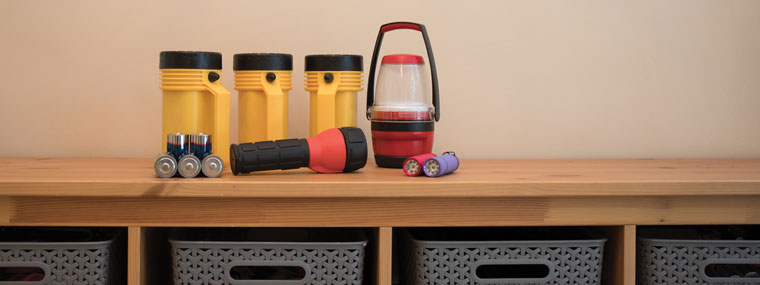
Time to Prepare, Be Aware, and Hunker Down
By Ron E. Peck / Published June 2023

Wow! It is hard to believe hurricane season is looming again. June 1st marks the first official day of the 2023 season. Floridians know this is a time to prepare and be aware.
For many residents last year’s hurricane devastation is still a clear and present reality. Ian’s impact on the state will be long lasting and memorable. Fellow Floridians throughout the state are still reeling from the effects of monster storms from the past couple of years. Infamous storms like Ian, Irma, Michael, and other natural disasters have left their indelible marks in their wake. These past storms and disasters to come have the potential to impact structural foundations and natural vegetation which have influences on all aspects of safety and regulations.
In 2021 Champlain Towers South, a Surfside, Florida, association property, collapsed on Miami Beach. Although this travesty was not hurricane related, one of the lessons learned was the importance of ongoing maintenance and proactive measures to ensure structural integrity.
The large migration of new residents, natural disasters, and devastating anomalies like the Cham-plain Towers South have prompted leadership to assess regulations and practices to ensure the safety and well- being of all Floridians.
Insurance companies are feeling the massive effects of these events. The state has begun to implement processes for preparation and milestone inspections. A new requirement, a strategic integrity reserve study (SIRS), involves architects and licensed engineers to provide phase one and two milestone inspections. These inspections provide a thorough assessment about the structural integrity of the building and recommendations for further action. The goal is to ensure that maintenance and repair work are conducted on condominiums and cooperative association buildings to prevent any avoidable accidents or disasters. It is recommended that you review your property with a reserve study specialist, structural engineer, or architect prior to the storm.
These storms seem to be more powerful and develop much more quickly than in the past. It is imperative the insurance companies remain in Florida to protect residents and associations.
There is a lot of preparation and consideration when a hurricane takes aim at your area. Being prepared and informed is critically important. The most basic planning like gathering storm supplies, understanding evacuation routes, and preparing your association’s property are just the beginning. Plans should be implemented early and include pre- and post-storm tasks. Consider utilizing both cloud storage and hard copies in the event you are unable to access electronic files due to hurricane damage.
Finances is one of the areas that needs to be at the top of the list, but in the midst of preparation can be overlooked or under-considered. Here are some financial preparations you can take before a storm to ensure your money is well accounted for.
- Make sure you have your insurance documents available, reviewed, and understood with your insurance agent. Many disputes occur because of a lack of proper record maintenance and/or pre-existing conditions. Insurance companies will delay, deny, or defend their position regarding your policy. As for condominiums, you can mitigate further damage. Examples include taking action to contract for the removal of debris and prevent or diminish the spread of fungus, including but not limited to mold or mildew. This can be accomplished by removing and disposing of wet drywall, insulation, carpet, cabinetry, or other fixtures on or within the condominium property, even if the unit owner is obligated by the declaration or law to insure or replace those fixtures and to remove personal property from a unit. Your insurance should cover the cost of temporary repairs for hurricane damage and reasonable additional living expenses (ALE) over and above your normal living expenses. If you have to relocate, have a plan for the speedy removal of debris by maintenance staff, outside contractors, or public works employees. Even with these tips, many will attest it can be a huge fight for the insurance proceeds to be paid out quickly.
- Have all your banking records including account numbers and financial statements backed up via cloud or other digital storage devices. Signers should be up to date, even alternate signers if needed; make contingency plans for back-up signatories in case evacuation or relocation becomes necessary. Update all your accounts. You want to make sure you have access to records and resources at the earliest convenience.
- Properly fund money in your reserves. Pooling is suggested in most cases; however, you may have to pool for both regular reserve items and mandatory SIRS items. Fund as fast as you can because this will be a mandatory requirement by the end of 2024 in Florida. You might as well start NOW, especially boards of directors (BOD) that have been waiving reserves in past years.
- Apply for a line of credit (LOC). These loans are for emergency purposes only and generally can range from $50,000 to $1,000,000. They are for stabilizing your association’s functionality. This includes having trees and debris removed, parking areas secured, security cameras re-activated, amenities restored, etc. This may also cover your insurance deductible in some cases. Additionally, no interest is charged until disbursement. Remember, there will be a more extensive review and understanding of the size and scope of the rebuild for a possible term loan with more money after you have uncovered all the necessary items for repair.
Keep all financial documents safe and protected. Copies of important documents like account numbers, bank statements, tax records, important receipts, etc. should be photocopied and placed in plastic bags to protect against any water damage. Upload any digital copies of important documents as backups and save them in a password protected cloud storage platform.
Don’t forget your vendors. Your trusted vendors need to know what you expect of them before, during, and after a disaster. Have all their contact information: name, address, phone numbers, cell phone numbers, email addresses, etc. readily available.
Hurricane Financial Records Checklist for Protection
- Insurance policies
- Social Security card, driver’s license, passport, and other identification cards stored on site
- Association credit cards
- Tax records
- Titles and deeds
- Photographs of the property
- Attorney documents
After the storm, remember that home repair scams are very common. Make sure you hire someone who is licensed and insured to do any repair work on your property. Get quotes from multiple local contractors. Pay in installments as the work is being completed. Do not pay the full amount up front. Be cautious of anyone who comes to your door and only works for cash. Use a check or credit card, so you create your own record of payment.
Finally, disasters happen. Recovery takes time. Preparation is key to a smoother and less stressful resolution. Hopefully this year’s storms will stay away, but if not, be prepared to hunker down (again).
Ronald E. Peck
Senior Association Banking Relationship Manager, Centennial Bank
Ronald E. Peck is the senior association banking relationship manager for Centennial Bank. He has 40 years of experience in relationship building, sales, and leadership. He is an active member of the Central Florida Community Associations Institute (CAI) chapter. He holds a bachelor’s degree in business from Florida Institute of Technology. He is a licensed community association manager (CAM) in the state of Florida and a past member of the Building Managers International (BMI).




